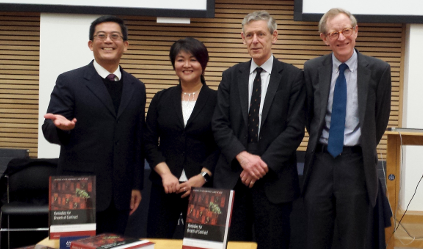Book Launch: Studies in the Contract Laws of Asia Vol I
Associated people

Thursday 3 March saw the very well attended book launch of Volume I of the series Studies in the Contract Laws of Asia edited by our own Professor Mindy Chen-Wishart, along with Professor Alexander Loke (City University, Hong Kong), and Associate Professor Burton Ong (National University of Singapore, and Vinerian Scholar). The launch was opened by an introduction by Dean Anne Davies.
Professor Chen-Wishart detailed the trials and tribulations of editing this volume. Negotiating the different Asian inter-personal sensibilities, the sensitivities of post World War II Asian politics, and the issues arising from contributors writing in a foreign language, amongst others, made this volume particularly challenging to edit. At the same time, Professor Chen-Wishart noted that all the contract laws of the Asian jurisdictions covered were transplanted from European jurisdictions such as England, Germany and France and she gave examples of the interesting evolution of these laws in their new homes.
Professor Loke explained the book cover as one that would be very familiar to Asian audiences but may be puzzling to an European one- it shows the drawers containing traditional medicins as a nod to the subject of Volume I, namely remedies for breach of contract. Professor Loke also noted some convergences and divergences in the law, and drew attention to the subversion, emasculation, clash of civilizations, puzzles and confusions contained in the various chapters.
Lord Toulson of the Supreme Court noted four standout features of the book that made it an extremely impressive work. First, it’s originality since there is no similar published work. Second, its informative value because in a global economy, the need to understand the contractual framework and concepts used in other jurisdictions is of increasing practical importance. Third, it poses important questions about the what and why of the laws of other jurisdictions. And, lastly its disciplined structure.
Professor Hugh Beale praised the book not only for being a good and useful book, but also because when you “open the pages, a storm of golden leaves come out, just packed with information and all very accessible and readable.” Professor Beale particularly praised the editors’ sound methodological approach. He also emphasized the importance in any harmonization project of exploring the underlying differences in philosophies between jurisdictions beyond the level of rules and of ensuring that contributing systems have a genuine sense of proprietorship derived from proper comparative work built on genuine engagement with the national laws.


